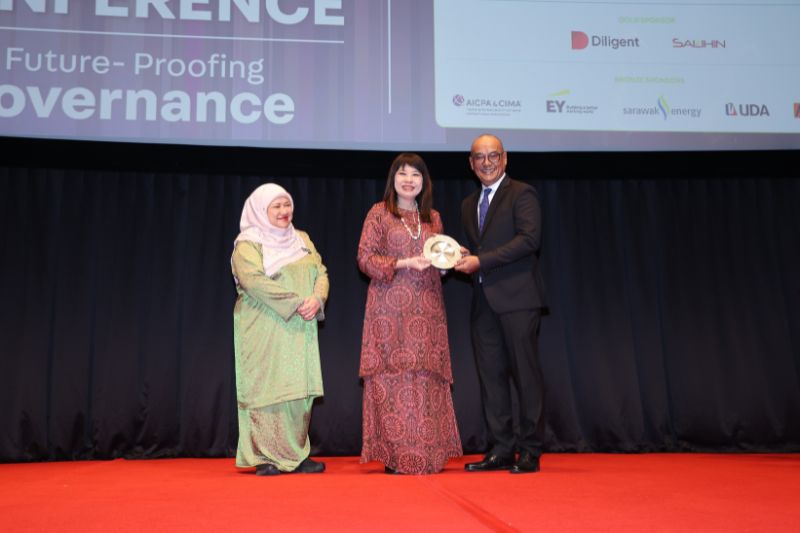With confidence in Malaysia’s economy strengthening, businesses committing to a global standard of governance and world-class risk management practices will contribute to raising the country’s competitiveness.
Adoption of Global Internal Audit Standards Key to Raising Malaysia’s Competitiveness
Malaysia can step up its position, from where it is currently ranked fifth out of 12 Asia-Pacific markets in the recent Corporate Governance Watch 2023 report, as companies commit to adopting the refreshed Global Internal Audit Standards, set to take effect on 9 January 2025. Among other measures, the Global Standards shaped with 15 guiding principles provides an opportunity for Board members, management, and other functions to work closely with internal auditors as transformation partners in addressing emerging threats and in embracing opportunities. The Global Standards also provide statutory bodies with guidance needed to align with international best practices and improve overall governance in areas such as Environmental, Social and Governance (ESG), cybersecurity, and more.
“With increasing complexities and vulnerabilities, enterprises looking to uphold integrity, transparency and trust must future-proof their governance - a critical function in building business value and resilience,” said Mohd Khaidzir Shahari, President of The Institute of Internal Auditors Malaysia (IIAM) at the opening of its two-day annual National Conference.
He echoed YB Lim Hui Ying, Depuy Finance Minister II, who said that internal auditors are key players in ensuring that organizations are both sustainable and ethical. They are also instrumental in anticipating the future, as they design governance frameworks that are not only resilient but adaptable to the complexities of the digital age, cybersecurity threats, and sustainability challenges.
Since 2008, the Malaysian government has made it a mandatory requirement for public listed companies to establish internal auditing functions to provide greater assurance on transparency through corporate governance. However, adherence to global standards of Internal Audit is voluntary - leaving many organisations exposed to undesirable risks and unrealised value.
Khaidzir stressed that, “the new Global Standards set out the minimum requirements for internal audit to behave, whether they are in commercial or public sectors, and whether they are from big or small organisations. Consistency in applying these standards would elevate the profession, fostering trust, reliability, and confidence in the work of internal auditors worldwide. Ultimately, a universal commitment to global internal audit standards would solidify the profession's reputation as an indispensable asset to the business community.”
Khaidzir said that the urgency and demand for qualified and capable practitioners is now greater than ever - especially more than 1,000 listed companies on Bursa Malaysia, and a strong runway for listings before the close of the year1. According to IIAM, there are currently 827 certified internal auditors registered in Malaysia.
In closing the gap and addressing the readiness of internal auditors to tackle emerging issues and deliver stronger enterprise value, IIAM runs more than 90 workshops, conferences and certification programmes each year.
This includes its annual National Conference, which represents the largest gathering of internal auditors in Malaysia - with over 800 delegates in attendance, representing expertise from various sectors and industries. This year’s session featured topics addressing evolving issues requiring urgent attention such as ESG standards, Cybersecurity Resilience, Technology and AI Integration, and Fraud Detection, offering participants valuable insights into how these factors will shape the role of internal audit which must evolve to meet the demands of a rapidly changing business environment.
“IIAM remains committed to capacity building, promoting the integration of technology in audit processes and supporting auditors in becoming trusted advisors within their organizations. We should go beyond assessing compliance and controls and position ourselves as business partners. The future of internal audit holds immense potential, but it also requires us to rethink our approach…to drive meaningful change, to innovate, and to be key contributors to the success of the businesses we serve,” said Khaidzir.
Over the past year, IIA Malaysia has made strides in advancing the internal audit profession including continuous and closer collaboration with professional bodies, regulators, and policymakers. IIAM has also expanded its footprint in East Malaysia, helping businesses in the region foster a robust culture of internal auditing. Of note, IIAM has delivered the globally recognised Certificate in ESG to more than 95 internal auditors.
Khaidzir said that the IIAM will be rolling out more readiness programmes in the coming year, including fostering closer collaboration with regulatory bodies, related professional bodies and private institutions to raise the profile of the internal audit profession in Malaysia.
#InternalAudit #GlobalStandards #Governance #RiskManagement #Malaysia #MalaysianBusiness #Business #Economy #Competitiveness #Sustainability #ESG #Cybersecurity #Technology #AI #Innovation #Leadership #Success #Growth #Development #Future #Trends #IndustryNews #BusinessNews #TechNews #IIAM #


